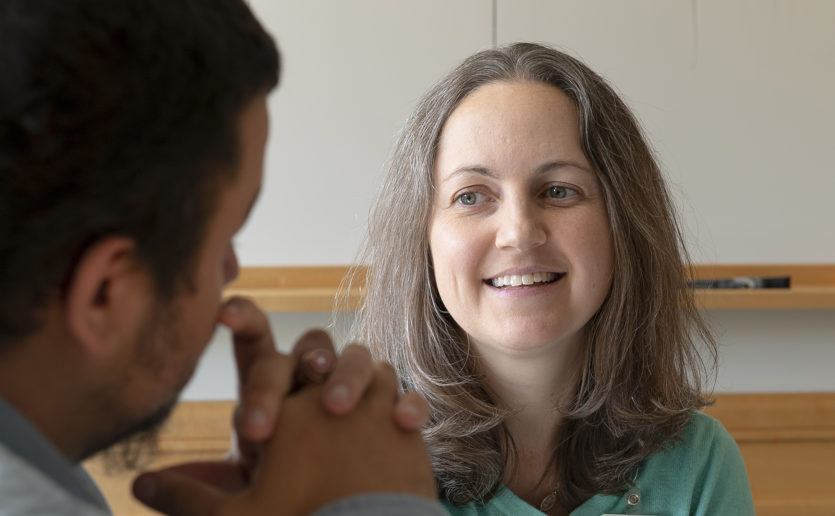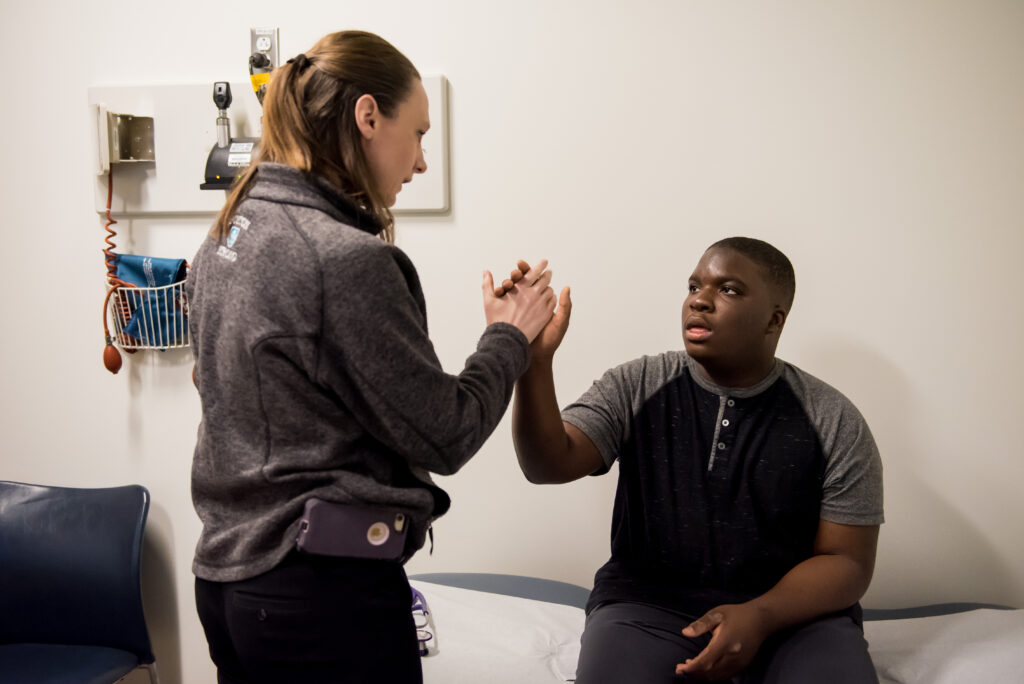A model patient navigator program at Massachusetts General Hospital is helping families impacted by autism spectrum disorder (ASD) and other developmental disabilities make their way through challenging medical situations with remarkable results.
For such families, a hospital experience can be daunting. The bright lights, strange sounds — even the gentle touch of caregivers — can overwhelm people with autism spectrum disorder. They typically have sensory sensitivities, social impairments, communication difficulties and repetitive patterns of behavior.
The program started as part of the Autism Care Collaborative, a groundbreaking initiative supported by the Ruderman Family Foundation.
Mass General’s program helps patients and families avoid problems by developing individual plans that detail each patient’s needs and interests.
The program started as part of the Autism Care Collaborative, a groundbreaking initiative supported by the Ruderman Family Foundation. It has helped at least 300 patients since its inception in 2016.
Based on growing patient demand, the foundation recently gave a new gift of $300,000 to expand the program to serve individuals with other developmental disabilities.
Promoting Inclusiveness for Disabilities
The Ruderman Family Foundation promotes inclusiveness for people with all disabilities. It also works to broaden Israeli understanding of the American Jewish community. The foundation supports the navigator program and the training of Mass General staff to work with patients with autism.
“When it comes to health care, being inclusive makes the whole process a better experience, especially for families with autism,” says Sharon Shapiro, a foundation trustee. “Mass General understands the importance of this and is willing to do the work needed to make this happen.”
Navigating as a Team
At the heart of the Mass General navigator program is Karen Turner, MS, OTR/L, an occupational therapist skilled in helping people with autism. As a navigator, Ms. Turner works closely with patients and families to develop the plans.
“Each plan captures the need-to-know information,” Ms. Turner explains. It includes how a person communicates, their sensory needs, and what comforts them, including accommodations. The plan also covers their tolerance of such common medical tasks as receiving an IV.
Ms. Turner shares the plan with the patient’s care team — from the front desk to medical staff.
Ms. Turner shares the plan with the patient’s care team — from the front desk to medical staff.
Patients with sensitivities to light and noise go to quieter, dimmer rooms. Those who need to move are given a special cushion to wiggle on or a rocking chair. And when patients are unsettled by a caregiver’s effort to draw blood or take blood pressure, staff demonstrate the procedure first on a family member or show visuals of it.
Learning about patients’ special interests from information shared by the navigator can help staff comfort and communicate with patients in stressful situations.
One patient in his 20s, who loves heavy metal music, needed surgery, Ms. Turner recalls. When the patient came into the operating room, the surgeon played a song from one of the patient’s favorite groups on his iPhone to help calm him.
Augmenting Ms. Turner’s efforts is a network of 90 disability “champions” spread throughout Mass General. In their areas, these champion nurses, physicians, security officers and other staff take the lead in helping such patients.
Patient Navigator Paves the Way
Earlier this year, Ms. Turner and some devoted Mass General champions helped Perla Levy and her family navigate a complex set of medical treatments for her son, whose vision was failing.
His case was complicated. As a child, he hit himself, frustrated over his inability to communicate. Despite efforts to curb his self-injuring behavior, he continued. First, he lost vision in his right eye. Now, at age 36, his left eye was failing from a trauma-induced cataract.
The Mass General Lurie Center for Autism, where he was treated, quickly called in Ms. Turner. The planning began. Ms. Turner consulted champion physicians and nurses at Mass General. She also reviewed records from previous hospitalizations elsewhere that hadn’t gone well.
“It gave me goosebumps,” Ms. Turner says. “He knew that I had helped him.”
A Sign Language Thanks
A specialist at nearby Massachusetts Eye and Ear agreed to perform the surgery but was not equipped with a special intensive care unit (SICU) to keep him sedated for the five-day healing period after surgery. If he hurt himself during this time — a near certainty in the situation — he would likely go blind.
Ms. Turner arranged an immediate post-surgery transfer to a Mass General SICU. Once at Mass General, Ms. Turner “was very involved every day,” Mrs. Levy says.
The SICU staff, Mrs. Levy says, was “exceptional.” As clinicians reduced the sedation, her son began to engage with them. “He responds to people who are not intimidated by his condition and interact with him, who are caring and compassionate and doing the best to help him,” Mrs. Levy says. “That’s what they did for him.”
The son returned home with his vision restored. Days later, the family returned for a follow-up visit. Ms. Turner met up with them. The son used sign language to say, “Thank you.”
“It gave me goosebumps,” Ms. Turner says. “He knew that I had helped him.”
To learn more about the patient navigator program or to make a donation, please contact us.

